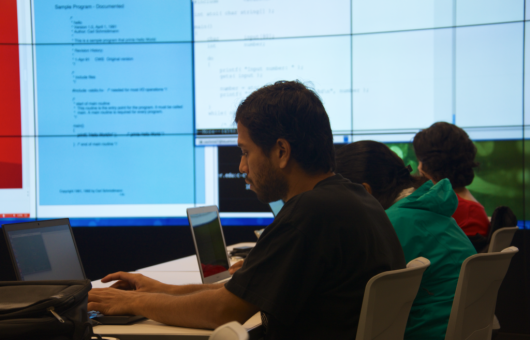 The Center for Integrated Research Computing (CIRC) hosted a summer school program July 22 – August 28, 2014, expanding the academic services it provides to the University community. Twelve courses on topics including Linux, programming languages, computing platforms, and specialty software are designed to help researchers better incorporate supercomputing into their research.
The Center for Integrated Research Computing (CIRC) hosted a summer school program July 22 – August 28, 2014, expanding the academic services it provides to the University community. Twelve courses on topics including Linux, programming languages, computing platforms, and specialty software are designed to help researchers better incorporate supercomputing into their research.
“As data science becomes more essential to research in all areas of science and engineering, CIRC staff have received requests from both faculty and students for fast-paced, introductory workshops to help them boost their technical skills as researchers,” said Brendan Mort, Ph.D., Director of the CIRC.
The courses offer hands-on introductions to languages, tools, and techniques for computational science and data analytics, with emphasis on uses with BlueHive 2 — the primary system running demanding computations for more than 650 researchers. “Students see our workshops as supplementary to their coursework. Faculty see them as a chance to brush up on new technologies and methods,” Mort said.
Letty Salas Estrada, who completed four CIRC classes, is a graduate student in biology who uses molecular dynamics simulations in her research. “I regularly use different tools for analyzing simulations that are or need to be written in different languages so that they are compatible with already existing packages. The workshops offered by the CIRC seemed like a great opportunity to obtain basic training in some of these programming languages,” Salas Estrada said.
Graduate student Farrukh Nauman, who studies computational astrophysics, signed up for three CIRC classes, including one about Open MPI. Nauman explained, “I routinely run my code on multiple processors, sometimes on 1,024 or more processors, so it is important for me to understand how to parallelize code.”
“Students see our workshops as supplementary to their coursework. Faculty see them as a chance to brush up on new technologies and methods.”
The inaugural CIRC Summer School has been a resounding success. More than 50 faculty and students registered for one or more classes. “The students and faculty absolutely love the classes!” Mort said. “When we announced the CIRC Summer School earlier in the summer, we had so much demand that we had to close registration for the classes within three days!”
“The classes make a point of going through the essentials and making the material very accessible for beginners,” Salas Estrada said. “I found the class exercises particularly useful, and I’m sure I will be using the provided class notes when trying to write my own scripts. In the future, I hope to write my own tools in some of these programming languages in order to analyze simulations at different levels of modeling.”
According to Mort, the success of the inaugural CIRC Summer School means it will become an annual program. “In fact, we looked at this year’s CIRC Summer School as a pilot project for Tech Boot Camp, which we will run during the semester,” he said. More information on Tech Boot Camp is forthcoming.